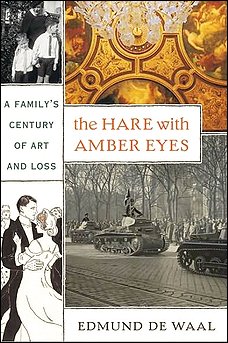The Book Club Online is the oldest book club on the Internet, begun in 1996, open to everyone. We offer cordial discussions of one book a month, 24/7 and enjoy the company of readers from all over the world. Everyone is welcome.The HARE with AMBER EYES
A FAMILY'S CENTURY OF ART AND LOSS
by EDMUND de WAAL
 | "In The Hare with Amber Eyes, Edmund de Waal unfolds the story of a remarkable family and a tumultuous century. Sweeping yet intimate, it is a highly original meditation on art, history, and family, as elegant and precise as the netsuke themselves.When the Nazis took over Vienna, the family's loyal maid Anna simply hid these miniature works of art in her mattress, some 264 pieces depicting turtles and tigers and rats, a boy with a helmet and samurai sword, a naked woman and an octopus, a hare with amber eyes. Edmund de Waal eventually inherited the collection, and it serves to link the various parts of his story as he traces how the netsuke pass from one family member to the next." Edmund de Waal
|
Discussion Schedule:
Feb. 1-2 Prologue
Feb. 3-7 Part One ~ Paris ~ 1871-1899
Feb. 8-12 Part Two ~ Vienna ~ 1899-1938
Feb.13-17 Part Three ~ Vienna ~ 1938-1947
Feb.18-22 Part Four ~ Tokyo ~ 1947-2001[
Feb. 23-27 Coda ~ Tokyo, Odessa, London ~ 2009
|
For Your Consideration
February 1-3
Prologue
1. Why do you think the author was awarded one of the eight scholarships to learn the Japanese language and culture? How old was he then?
2. What brings the author's uncle to Japan? How did Uncle Iggy come to possess the netsuke collection?
3. "Growing old in Japan is wonderful." Were there any reasons given to support this statement?
4. What do you know about the netsuke, how they were used? What are some of the characteristics de Waal admires about this collection Uncle Iggy has left him.
5. How old, how valuable are the netsuke the author's children play with, the medlar, the "losable" object he carries around London in his pocket, mingling with change and keys. (What is a
medlar?)
6. What does the author intend to do in the three months he has cleared on his calendar? What is it he feels compelled to learn?
7. Do you have a "family archive," such as the one his father turned over to his son before he set out? That family tree annotated by his grandmother, for example.
8. Do you suspect those inscribed volumes by Thomas Mann are going to prove useful? Have you read any of his work?